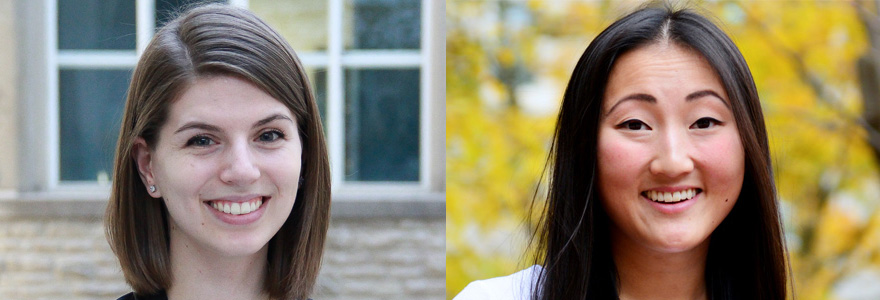Feature: Engaging the community in cancer research

The Canadian Cancer Society’s Research Information Outreach Team (RIOT) was created to spread the word about the progress and promise of cancer research. Established in London in 2010, RIOT has since grown into a national network of trainees and community members.
The London RIOT team recently launched a blog, called News and Views, to showcase cancer research taking place locally and provide trainees with an opportunity to write about research in an accessible and compelling way.
We spoke to Madeleine Van de Kleut, PhD’20, MSc'21 (CAMPEP), and Claire Park, MCISc/PhD Candidate (CAMPEP), about the blog and the value of science communication.
What is London RIOT’s News and Views blog?
Van de Kleut: The purpose of the blog is to showcase current cancer research taking place in the local region – at Schulich Medicine & Dentistry, Robarts Research Institute and Lawson Health Research Institute. Graduate students contribute to monthly blog posts in collaboration with communication specialists and community members, which are published on the London RIOT website.
We started this initiative in September and encourage students to write about something that excites them – whether it is basic science or clinical research. We’ve been focusing on papers that have been published, so they have gone through the peer-review process. Our stories break these papers down in a more accessible way, to make them more understandable.
We highlight the methods and results, but also emphasize the bigger impact and how the research will influence the standard of care in the future.
What is your goal for the blog?
Park: The goal is to bring focus to the great research taking place at Western and locally across the city. For the general public, cancer research can be fairly elusive. We wanted to communicate what cancer research entails and how it is translated from the lab into clinical practice.
We’re hoping to reach anyone who has been impacted by cancer or is interested in cancer research and share the significant scientific advances happening right here in London. Social media has helped us share the blog posts with the community and we’ve received some great engagement and feedback.
Why is communicating research in this way so important?
Van de Kleut: Part of my PhD studies involved managing a clinical trial. I was interacting with patients and learning to communicate with them, not only about the importance of the science and how it was contributing to future care, but also breaking it down to a level they understand. Being able to communicate to the wider public is similar. If people understand what we’re doing and how it can impact them and their families, then they may be more willing to engage as participants in research studies, as volunteers or as donors.
Park: To echo what Madeleine said, it’s important to communicate the relevance and impact of these new discoveries in cancer research. It can also influence the next generation of cancer researchers. With the blog and other events, we’re providing an opportunity for young students to engage with cancer research.
Why did you get involved with London RIOT?
Van de Kleut: I completed a PhD in Biomedical Engineering at Western, with a focus on orthopaedics and I really enjoyed it. But in thinking about a career, I was drawn to medical physics and the role of a radiation oncology medical physicist in helping ensure patients receive safe and appropriate radiation treatment as part of their cancer care. To shift my brain from a biomechanics perspective to a cancer perspective, I wanted to learn more about what was going on in the cancer field as a whole, in order to have a diverse background going into this career.
Park: For me, getting involved has helped me appreciate the importance of disseminating research beyond the lab and academic environment. It’s an opportunity to involve the community in the exciting work we do and to share our passion for science. It’s been a rewarding experience.
What other London RIOT initiatives are on the go?
Park: We help organize the annual Let’s Talk Cancer event, hosted in partnership with Let’s Talk Science. The aim is the introduce high school students to STEM and cancer research, with engaging presentations and interactive workshops. Many of the activities are led by graduate trainees and members of the RIOT team.
We also plan other community events and presentations, including Progress in Cancer Research Symposium and are involved as a community partner in a cancer research-focused Community Engaged Learning placement through Western.
We’re always open to supporting new initiatives that align with RIOT's values and mandate, to share the progress and promise of cancer research. If trainees are interested in getting involved and have new ideas, please reach out.








